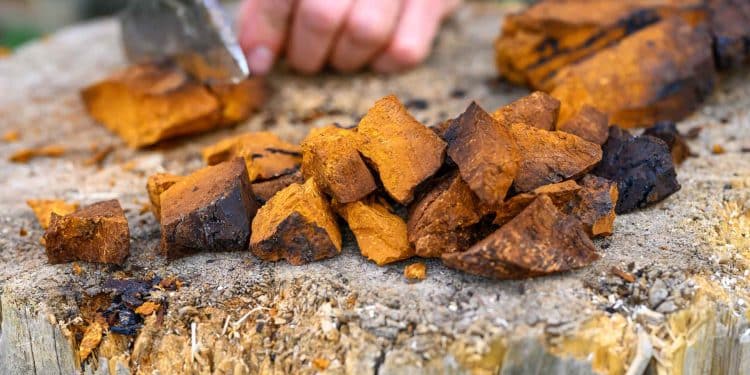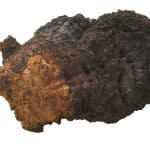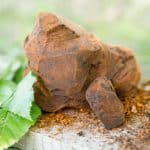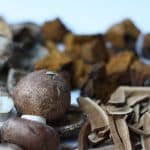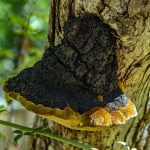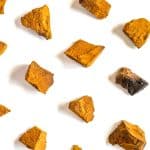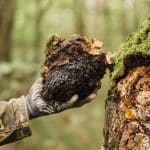We are frequently asked about chaga mushroom’s benefits on inflammation. After taking a closer look at what current studies say, we found that chaga’s anti-inflammatory potential is pretty impressive. Here’s how chaga mushrooms may benefit people suffering from chronic inflammation.
What are Chaga Mushrooms?
Inonotus obliquus, more commonly known as chaga mushroom, is a medicinal fungus found growing on Birch Trees. It prefers cold weather, growing mainly in the Northern areas of the Americas, Europe, and Asia. Chaga mushrooms have been a staple of alternative medicine for centuries. Certain regions in Siberia have relied on these adaptogenic mushrooms to cure various ailments for a very long time, and they are still an incredibly popular choice, particularly in skincare.
Does Chaga Cause Inflammation?
No, Chaga mushrooms are not known to trigger inflammation. On the contrary, according to a variety of clinical studies, medicinal chaga mushrooms seem to alleviate the bodys inflammatory processes.
Learn more: Does chaga mushroom strengthen your immune system?
For instance, one trial-tube study published in The Journal of Ethnopharmacology investigated the effects of alcoholic extract from the mushroom Inonotus obliquus on edema caused by carrageenan. The mushrooms extract appeared to exert anti-inflammatory effects for up to four hours after administration.
Can Chaga Mushroom Reduce Inflammation?
Yes, chaga mushroom can reduce inflammation. In a 2019 study, compounds found in the chaga fruit bodies were found to blunt the microvascular inflammation caused by histamines. At the microvascular level, inflammation negatively affects cell-to-cell communication, even leading to cardiovascular disease when prolonged, chronic inflammation is present in the body. Chaga mushrooms contain several compounds that seem to mitigate microvascular inflammation. These findings are promising and call for more studies into the precise mechanisms of chaga and its effects on inflammation.
An animal study investigated the effects of extracts from Inonotus obliquus mushrooms in ulcerative colitis, a chronic inflammatory disease. Mice given the chaga extract showed lower levels of inflammation compared to their control group. These mice had lower levels of the pro-inflammatory compounds immunoglobulin E (Ig)E and IgA in their spleens. They also showed little evidence of inflammation-induced destruction of colonic tissues. Inonotus obliquus may therefore be a powerful anti-inflammatory agent and natural alternative for treating chronic inflammatory diseases.
Chaga’s Anti-inflammatory Benefits for Skin
Chaga has been used for centuries for skincare, since it seems to alleviate skin problems associated with inflammation, as well as protecting against sun damage. A clinical study published in The Journal of Cosmetics, Dermatological Science & Applications investigated antioxidant and anti-inflammatory effects of Chaga and Birch Sap on the skin. Betulinic acid, found in birch sap, and several compounds found in chaga (such as ergosterol, inotodiol, lanosterol, and trametenolic acid) were confirmed to protect the skin, alleviate inflammation, and restore damage caused by UV radiation.
More Info on Inflammation
Inflammation is a reaction by your immune system against a perceived threat or danger. Essentially, your body releases white blood cells, which contain chemicals that protect your body against infection.
Learn more: Does Chaga mushroom lower blood pressure?
Unfortunately, this can go rogue and lead to chronic health problems. Your body releases special cells and substances into your bloodstream when it senses threat. These threats may come from foreign invaders, like viruses and bacteria; they may also come from harm done to the body, like a chip, wound, or burn.
What Causes Inflammation in the Body?
The most common causes of inflammation are the presence of bacteria or viruses in the body. However, an autoimmune disease, like Lupus, can lead to your body attacking your own healthy tissues, leading to inflammation. Allergies, along with exposure to harmful chemicals, could also trigger inflammation.
Why is Inflammation Bad?
Short-term inflammation is not bad. It is the long-term, chronic kind that is bad. Ideally, your body will fire off an inflammatory response to deal with an issue, neutralize the threat, and go back to normal.
Often, though, people experience persistent inflammation, not in response to any particular threat, but as the “new normal”. Many people today have chronic inflammation in their bodies, either in full-blown expressions like one of many diagnosable autoimmune diseases, or as more sub-grade forms. Poor diet, stress, toxins, or other triggers may all cause your immune system to produce inflammatory cells. Here are some symptoms of chronic inflammation:
- Reduced cognitive abilities
- Fatigue
- Hardening of the arteries
- Blood clotting
- Rashes
- Lower back pain
- Diarrhea
- Insulin resistance
- Joint stiffness and joint pain
- Abdominal pain
- Chest pain
- Fever
Here are some of the most common conditions tied to chronic inflammation:
- Rheumatoid arthritis
- Multiple sclerosis
- Guillain-Barre syndrome
- Lupus
- Inflammatory bowel disease (IBD)
- Psoriasis
- Chronic inflammatory demyelinating polyneuropathy
- Graves disease
- Myasthenia gravis
- Hashimoto’s thyroiditis
- Vasculitis
- Type 1 diabetes mellitus
Chronic inflammation is really a bad thing. Fortunately, changes to your lifestyle, including changes to your diet, often help to lower it.
What We Can Conclude About Chaga Reducing Inflammation
Chaga mushrooms seem to reduce inflammation, according to both in-vivo and in-vitro studies. Inonotus obliquus blunted the histamine-induced inflammation of the microvascular system, according to animal studies.
You can find our favorite capsules, powders, and tincture’s on the following pages of our website and learn more about each individually:
Inonotus obliquus appears to relieve symptoms of chronic inflammatory diseases, particularly ulcerative colitis. Compounds found in Chaga seem to exert anti-inflammatory and protective effects on skin, as well as repairing skin damage.
More studies on humans are needed to investigate underlying mechanisms in chaga mushrooms and their effects on inflammation. Given the lack of negative side effects associated with taking chaga mushrooms, it might make sense to incorporate it as an additional natural remedy for managing chronic inflammation.
